1st January 2021: Studying in the United Kingdom – the new rules
01.01.2021 is approaching, and with it the new legislation for EU students studying in the United Kingdom. Here is a short guide to help explain* (more…)
01.01.2021 is approaching, and with it the new legislation for EU students studying in the United Kingdom. Here is a short guide to help explain* (more…)
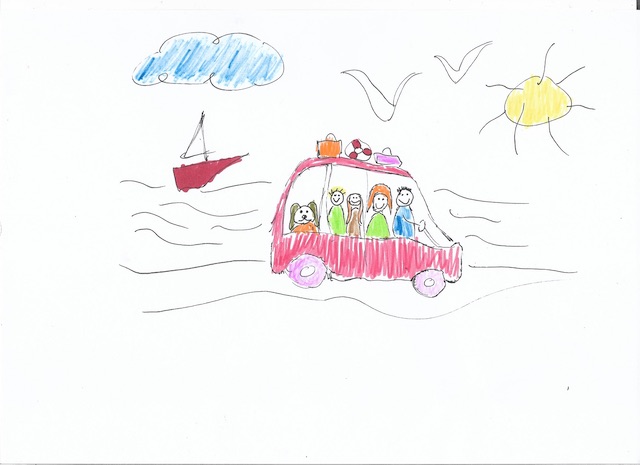 This, or a similar topic, may well be your child’s first homework task of the new school year and, I am sure, often makes interesting reading for teachers. Several years ago – well before Covid 19 made working from home the norm – I was introduced to a chap at a drinks party and for some reason we got on to the topic of children’s homework. My new acquaintance made me laugh: having been given the writing topic “What my parents do”, his son had written that his father “sits at his computer all day in his dressing gown”. (It wasn’t until later that I discovered I had been talking to an Oscar-winning screenplay writer).
This, or a similar topic, may well be your child’s first homework task of the new school year and, I am sure, often makes interesting reading for teachers. Several years ago – well before Covid 19 made working from home the norm – I was introduced to a chap at a drinks party and for some reason we got on to the topic of children’s homework. My new acquaintance made me laugh: having been given the writing topic “What my parents do”, his son had written that his father “sits at his computer all day in his dressing gown”. (It wasn’t until later that I discovered I had been talking to an Oscar-winning screenplay writer).
This year, “What I did in my summer holiday”s essays might make repetitive reading for teachers; summer 2020 has been a Staycation for most and hearing about someone getting into an airplane or crossing an international boarder has become something of a novelty. My own holidays have involved 4Fs: family, friends, fresh air and France – not much to complain about there.
Teachers at boarding schools, meanwhile, have been recharging their batteries after the demands and complications of last term. Despite the expansive boarding school buildings throughout the country lying eerily empty for most of the term, teachers were kept busy ensuring that school life continued at its usual snappy pace from April to July – albeit it at a distance.
With the help of online platforms such as Google Meets and Zoom, boarding schools adapted swiftly. From Morning Chapel to end of day homework clinics, boarding schools maintained a varied and rich timetable for every pupil. The effort put in by teachers, their energy and initiative that I witnessed from schools’ sometimes daily emails was consistently impressive. Alongside regular, real-time full academic lessons, pupils were able to continue their extra-curricular activities. Chess club, science projects, cooking skills, photo competitions, art exhibitions, kite making, sports challenges, video film making…..the options were as comprehensive as ever – and often even more inventive. As the mother of one French pupil who followed an online timetable for the term said, “l’école a organisé les choses admirablement bien.”
Of course, everyone is now very keen to get back together on site, put aside their computer screens and enjoy human camarderie once again. Staff have been working tirelessly to put into place the current stringent regulations required in order to guarantee all pupils’ health and safety as they return to school. Most schools have signed up to the Boarding Schools Association Covid Safe Charter which gives clear guidance of the strict measures to be followed – made easier to adhere to thanks to the advantage private boarding schools have of spacious buildings, extensive grounds, small class sizes and low pupil to teacher ratios.
SUMMER 2019

Voici quelques idées pour votre enfant cet été*
JUIN
| Boarding school | 7-16 | 2 juin – fin juin/début juillet | £850+ = 1 semaine** |
| Famille + école locale, Irlande | 9-13 | juin : 2-4 semaines | 1,550€ = 2 semaines |
| Summer school académique à Oxford | 15-17 | à partir du 16 juin | £1,800 = 2 semaines |
| Cours de Business, Droit, Economics | 16-18 | à partir du 9 juin | £4,595 = 2 semaines |
| Camp de sport en Irlande | 11-17 | à partir du 9 juin | 1,695€ pour 2 semaines |
| Cours d’anglais chez une famille | 10-17 | à partir du début juin | £2,500 pour 2 semaines |
SUMMER SCHOOL + FAMILLE
| Cours d’anglais avec un autre étudiant international | 14-17 | 23 juin : 2 semaines+ | £1,640 = 2 semaines |
| Summer school organisée par une famille, Irlande | 11-17 | 1 juillet: 2-3 semaines | 1,550€ = 2 semaines |
| Summer school privée, à la campagne | 13-17 | 30 juin – 10 août | £1,400 = 2 semaines |
MON PREMIER SUMMER CAMP
| Camp d’été privé en Écosse | 8-16 | 23 juin – 17 août | £1,830 = 2 semaines |
| Camp d’été privé à côté d’un parc national | 9-15 | 30 juin – 17 août | £1,800 = 2 semaines |
| Summer school privé | 7-14 | 15 juin – 13 juillet | £1,400 = 2 semaines |
| Summer school dans une boarding school en Ecosse | 8-17 | 30 juin – 10 août | £1,700 = 2 semaines |
SUMMER SCHOOL GÉRÉE PAR UNE TOP BOARDING SCHOOL
| Est d’Angleterre | 8-17 | 7 juillet – 18 août | £2,400 = 2 semaines |
| Sud de Londres | 13-17 | 3 juillet – 31 juillet | £3,995 = 2 semaines |
| Sud-ouest | 12-17 | 7 juillet – 18 août | £2,725 = 2 semaines |
| Nord | 10-16 | 5 juillet – 2 août | £2,475= 2 semaines |
SPORT
| Tennis | 9-17
8-15 |
23 juin – 27 juillet
7 juillet – 28 juillet |
£2,200 = 2 semaines
£2,000 = 2 semaines |
| Rugby | 10-16 | 7 juillet – 17 août | £2,480 = 2 semaines |
| Golf | 10-17 | 7 juillet – 27 juillet | £1,990 = 2 semaines |
| Foot | 8-17 | 8 juillet – 12 août | £2,650 = 2 semaines |
| Basket | 9-17 | 30 juin – 17 août | £2,500 = 2 semaines |
| Équitation | 12-18 | 1 juillet – 26 août | 2,000€ = 2 semaines |
SPORTS NAUTIQUES
| Surf | 11-17 | 9 juin – 25 août | 1,695€ = 2 semaines |
| Plongée | 13-18 | 30 juin – 17 août | £2,400 = 2 semaines |
| Voile | 11-17 | 1 juillet – 17 août | £2,200 = 2 semaines |
PERFORMING ARTS
| Film/théâtre avec des enfants britanniques | 14-17 | 22 juillet – 4 août | £2,750 = 2 semaine |
| Danse académie | 12-17 | 7 juillet – 20 juillet | £3,000 = 2 semaines |
| Avec enfants britanniques | 13-17 | 14 juillet – 3 août | £3,050 = 2 semaines |
LONDRES
| Préparation pour médécine | 12-17 | 6 juillet – 10 août | £3,500 = 2 semaines |
| Anglais avancé | 16-18 | 2 juillet – 30 juillet | £3,110 = 2 semaines |
| Programme pre-universitare | 16+ | 30 juin – 21 juillet | £3,195 = 2 semaines |
CAMPAGNE
| 3 semaines d’activités en plein air dans 3 lieux différents | 15-19 | 1 juillet – 30 août | £1,999 = 3 semaines |
| Programme très complet qui termine avec 5 jours en mer | 8-16 | 5 juillet – 29 juillet + 12 juillet – 5 août | £5,500 = 3 semaines |
| Summer school sportive | 8-16 | 30 juin – 17 août | £2,300 = 2 semaines |
SCIENCES & TECHNOLOGIE
| Boarding school du premier rang avec un observatoire | 12-17 | 5 juillet – 18 juillet | £2,950 = 2 semaines |
| Science + anglais | 10-16 | 2 juillet – 13 août | £2,600 = 2 semaines |
| STEM (Science, Technologie, Engineering, Maths) | 13-17 | 29 juin – 10 août | £2,250 = 2 semaines |
ACADÉMIQUE
| Oxford, Cambridge: eg. Business, Engineering, Tecnhologie | 13+ | juillet et août | £4,595 = 2 semaines |
| International Relations, débat | 13-18 | 30 juin – 14 août | £4,400 = 3 semaines |
| Histoire, géographie, Business | 13-17 | 7 juillet – 30 août | £2,200 = 2 semaines |
| IELTS | 14-17 | 8 juillet – 5 août | £2,800 = 2 semaines |
INFORMATIQUE
| Coding | 10-16 |

Here are a few ideas for your children – big or small – this summer
BEGINNING JUNE
| Boarding school | 7-17 | 3 June – end June/beg July | £850+ = 1 week |
| Family + day school, Ireland | 9-13 | June : 2-4 weeks | 1,500€ = 2 weeks |
| Film school, London | 18+ | 4 June : 1 month | £2,095 = 4 weeks (+ accommodation) |
| Art or fashion, London | 16+ | June | 1,780 = 4 weeks (+ accommodation) |
MID JUNE
| Intensive English in an international boarding school | 7-17 | 18 June : 5 weeks | £5,750 = 5 weeks |
| High-tech team project | 16-19 | 18 June : 2 weeks | £2,200 = 2 weeks |
| Sailing school, Ireland | 14-17 | 17 June : 2 weeks | 1,850€ = 2 weeks |
| Summer school + family | 10-17 | 10 June : 2 weeks or more | £2,000 = 2 weeks |
| Academic summer school in Oxford | 15-17 | 17 June onwards | £1,750 = 2 weeks |
| Privately run summer school, countryside | 7-13 | 16 June: 1-4 weeks | £665 = 1 week + transfer |
SUMMER SCHOOL + FAMILY
| Summer school near the sea + large choice of sports | 7-17 | 9 June : 2 weeks+ | £1,200-£1,600 = 2 weeks |
| English tuition with another international student | 14-17 | 24 June : 2 weeks+ | £1,640 = 2 weeks + transfer |
| Summer school near the sea in Ireland | 12-17 | 24 June : 1 week+ | 680€ = 1 week + transfers |
| Family-run summer school, Ireland | 11-17 | 2 July: 2-4 weeks | 1,500€ = 2 weeks |
| Privately-run language school, countryside | 13-17 | 2 July: 2 weeks+ | £1,400 = 2 weeks + transfer |
| Summer school in Oxford | 10-17 | 1 July: 1 week+ | £690 = 1 week + transfer |
YOUNGSTERS
| Privately-run summer camp in Scotland | 8-16 | 24 June : 2 weeks+ | £1,730 = 2 weeks |
| Privately-run summer camp beside a national park | 9-15 | 1 July : 2 weeks+ | £1,780 = 2 weeks + transfer |
| Privately-run all-girl summer camp | 8-14
|
29 June : 2 weeks | £1,980 = 2 weeks |
| Summer school run by a number of top Prep schools | 6+ | 1 July : 1 week+ | £1,075 = 1 week |
| Traditional summer camp with British children | 7-16 | 21 July: 1 week+ | £650 = 1 week + transfer |
| Summer school run by a boarding school, south of England | 8-17 | 1 July: 1 week+ | £875 = 1 week + transfer |
SUMMER SCHOOL RUN BY BOARDING SCHOOL
| A taste of boarding school, East England | 9-17 | 8 July : 1 week+ | £1,200 = 1 week |
| Mixed activities, North England | 7-16 | 8 July : 2-3 weeks | £1,900 = 2 weeks |
| Scottish countryside: choice of sports | 10-15 | 1 July : 1 week+ | £1,120 = 1 week |
| Prestigious school near London | 9-17 | 7 July : 2 weeks+ | £2,850 = 2 weeks |
| All-girl boarding school | 8-17 | 14 July : 2 weeks+ | £2,200 = 2 weeks |
| Small boarding school in Scotland | 8-17 | 24 June: 1-4 weeks | £850 = 1 week |
| Outstanding summer school, Scotland | 8-16 | 6 July or 13 July: 3 weeks | £5,400 |
| American summer school near London | 10-17 | 25 June: 3 weeks+ | £3,960 = 3 weeks |
| Summer school near London with some British children | 11-17 | 8 July: 2 weeks+ | £2,600 = 2 weeks |
| Summer school with accent on sports | 8-16 | 11 July: 2 weeks+ | £2,300 = 2 weeks |
| Summer school specialising in water sports | 11-17 | 2 July: 2 weeks+ | £2,100 = 2 weeks |
| Traditional summer school | 10-16 | 6 July: 2 weeks+ | £2,400 = 2 weeks |
| Academic | 8-17 | 4 July: 2 weeks+ | £2,690 = 2 weeks |
SPORT
| Riding – north England
Riding – south England |
10+
10-15 |
24 June : 2 weeks+
15 July : 2 weeks+ |
£2,100 = 2 weeks + transfer
£1,700 = 2 weeks |
| Rugby – Scotland | 8-14 | 1 July : 2 weeks | £1,950 = 2 weeks + transfer |
| Golf – Scotland | 10-17 | 8 July : 2 weeks | £1,795 = 2 weeks |
| Tennis | 15-21 | 1 July : 2-4 weeks | £1,830 = 2 weeks + transfer |
| Sailing | 14-17 | 17 June : 2 weeks | 1,850€ = 2 weeks |
| Athletics | 12-17 | 8 July : 2 weeks+ | £2,645 = 2 weeks + transfer |
| Fencing | 12-17 | 8 July : 2 weeks+ | £2,805 = 2 weeks + transfer |
| Martial Arts | 12-17 | 8 July : 2 weeks+ | £2,805 = 2 weeks + transfer |
| Dance | 12-17 | 8 july : 1 week+ | £1,425 = 1 week |
ARTS
| Film/drama with British children | 14-17 | 23 July : 2 weeks | £2,500 = 2 weeks + transfer |
| Design, Fashion | 13-16
|
1 July : 2 weeks
|
£3,175 = 2 weeks + transfer |
| Music | 8-18 | 29 July : 1 week+ | £895 = 1 week + transfer |
SCIENCE & TECHNOLOGY
| Accent on Maths & Science, Ireland | 9-17 | 24 June : 1 week+ | 850€ = 1 week + transfer |
| Technology camp with British children | 9-17 | 8 July : 2 weeks | £2,700 = 2 weeks + transfer |
| Coding | 13-16 | 3 July : 2 weeks | £2,500 = 2 weeks |
ACADEMIC
| English summer school in France | 11-15 | 2 July : 2 weeks | 2,000€ = 2 weeks |
| University preparation in Cambridge | 16-18 | 3 July : 2 weeks | £3,300 = 2 weeks |
| Academic subjects | 7-18 | 30 June : 1 week+ | £1,380 = 1 week |
| IELTS | 10-17 | 9 July : 3 weeks | £3,300 = 3 weeks |
WITH BRITISH CHILDREN
| Summer camp multi-activity | 7-16 | 21 July : 1 week+ | £650 = 1 week + transfer |
| Summer school near Oxford | 8-14 | 15 July : 1 week+ | £1,085 = 1 week |
| 3 week outside activities in 3 different locations | 15-19 | 25 June : 3 weeks | £1,999 = 3 weeks |
| Classic summer camp | 6-17 | 8 July : 1 week+ | £800 = 1 week + transfer |
BUDGET
| Family + summer school, Ireland | 11-17 | 2 July : 2-4 weeks | 1,550€ = 2 weeks |
| Summer camp multi-activity | 7-16 | 21 July : 1 week+ | £650 = 1 week + transfer |
| Summer school near the sea + large choice of sports | 7-17 | 9 June : 2 weeks+ | £1,200-£1,600 = 2 weeks |
| Summer school near the sea in Ireland | 12-17 | 24 June : 1 week+ | 680€ = 1 week + transfers |
| Privately run summer school, countryside | 7-13 | 16 June: 1-4 weeks | £665 = 1 week + transfer |
| Family-run language school, countryside | 13-17 | 2 July: 2 weeks+ | £1,400 = 2 weeks + transfer |
WORK EXPERIENCE
| 15h English classes + 15h work experience per week
|
16+
|
All year – 2 weeks minimum
|
£1,400 = 2 weeks
|
| 20h English classes + 20h work experience per week – Ireland | 18+
|
All year – 4 weeks minimum | 500€ = 1 week + 500€ work placement
|
| 2 weeks English classes + 2 weeks work experience
|
16+
|
All year – 4 weeks minimum
|
£1,050 = 4 weeks
|
SUMMER CAMP PLUS
| 2-4 week programme near London | 10-18 | 8 July | £3,700 = 3 weeks |
| 3 week programme | 13-18 | 1 July | £4,200 = 3 weeks |
USA
| Summer camp run by private boarding school | 8-15 | 23 June : 3 weeks
|
$5,735 = 3 weeks + transfers + outings |
| Summer school based at top university | 13-18 | 15 July : 3 weeks | $6,600 = 3 weeks |
| Summer camp with top-level, professional sports coaching | 8-16
|
24 June : 1 week+ | $1,500 = 1 week + transfers + outings |
| Family for 2 weeks + summer camp for 2 weeks | 12-17 | 15 June : 4 weeks | $3,540 = 4 weeks |
| Camp intensif de foot | 8-16 | 30 June : 2-4 weeks | $3,180 = 2 weeks |
“Oh, London is a man’s town, there’s power in the air;
And Paris is a woman’s town, with flowers in her hair;
And it’s sweet to dream in Venice, and it’s great to study Rome;
But when it comes to living there is no place like home.”*
My brother remembers a boy at his Prep school in the 70s, when he was about 8 years old, who, the moment his
parents had dropped him back at school, would race down the drive in a bid to escape. In those days, conditions at
boarding schools were generally pretty tough and it was more or less standard to be permanently miserable,
constantly homesick. Since it was rare to find any support from within the school, pupils had the choice between
keeping a stiff upper lip (ie. supressing their feelings) or running away.
Happily, much progress has been made since then. Homesickness has not been eradicated, of course: the next few
weeks will no doubt see boarding schools throughout Britain coping with numbers of tearful children. On the whole,
however, after the first few days of no doubt feeling rather lost, pupils will be so busy – in and out of the classroom
– and making friends that they will hardly have time to be feel blue. Getting involved in all that is on offer is a key
element in feeling part of the school and, in some small way, ‘at home’.
And what an enormous variety is on offer these days to keep pupils occupied throughout the week and the week
ends. A transformation from my own boarding school days, from which I can remember two extra-curricular events:
1) watching the film “To Kill a Mocking Bird” on a big screen in the school hall and 2) stopping off for chips after
going to a play in a local town (I can’t remember what play; the chips were much more memorable). I can
remember because they were about the only extra-curricular things that happened over 4 years of boarding school. Most week-ends were spent eating sweets, which might help overcome the Blues in the short term but make them
very much worse in the long run.
Of course – I say from my own experience – it is not uncommon for the parents to suffer the blues as well, feeling
the hole left by their absent child. And so arises the question: how often should parents make contact? Perhaps a
little more than a closely-monitored call once every half term on the House phone (harking back once more to my
own schooldays) but perhaps a little less than a long Skype home every evening. A family whose 10 year old son
has just started at a Prep school in England have been advised by the Headmaster not to call for the first week: a
gentle way of saying ‘let us do our job and give him time to settle in without distractions from home.’
Rest assured: on hand today are a friendly team, well-qualified to listen to a child’s needs outside the classroom as
well as in. These include a Housemaster or Housemistress and their deputy, a Tutor, Matron, nurses in the
infirmary, generally a chaplain and several other members of staff who a child can turn to for pastoral care. There is
no longer any need to bottle up the blues, sharing them only with the pillow and teddy at night-time.
*Henry Van Dyke, 1909
“Why, Sir, you find no man, at all intellectual, who is willing to leave London. No, Sir, when a man is tired of London, he is tired of life; for there is in London all that life can afford.” Samuel Johnson*
There is no disputing that London is an exciting, vibrant city – currently The Place to
Be. However, whilst I cannot deny that, if I found a pot of gold, I wouldn’t say no to a
house in Chelsea, I can assure you that there is a great deal more to England (and
indeed Britain) than London and I urge you to take the time to explore it. Britain may
not have France’s glamorous ski stations or sunny beach resorts (why do you think
we Brits flock to them?) but, it does not lack variety, colour – and, above all, LIFE – lots of it.

In Britain, it is perfectly normal to live in the countryside full time; in fact, according to
official statistics, the rural population of England is growing steadily. Even in the
smallest village there is a pleasant feel of bustle and activity and a strong sense of
community and family life; the countryside is generally agreed to be the best place to
bring up children.
Of course, country life would not be complete without a local pub or two. Gone are
the days of my childhood when my sister, brother and I were banished to the pub car
park with a bag of crisps whilst my parents enjoyed their weekend shandy:
nowadays, with licensing rules relaxed, pubs heave with families and offer all kinds of
food, from ‘home grown’ fish and chips to the rather more exotic Thai curry.
And then there are the countryside-based schools, both private and state, day and
boarding. There is no lack of them: in fact, the choice can be bewildering. I have a
list of 405 boarding schools (all based outside London) and am on a mission to visit
them all: roughly 200 to go.

Accompanied by BBC radio, I have motored thousands of miles up and down the
country over the past three years, driving from Ashby-de-la-Zouch to Barton-in-the
Beans via Upton Snodsbury, Westley Waterless and Great Snoring, taking in
Llanfairpwllgwyngyllgogerychwyrndrobwll-llantysiliogogogoch on the way. I have
encountered goats clinging on to Welsh cliffs, New Forest ponies roaming across the
Hampshire roads, found myself stuck behind sheep in a Wiltshire lane and been held
up by a couple of cows wandering along a Surrey High Street on a Monday morning.
Thanks to these unhurried creatures and the extra mile-long drive many schools
possess, I have often arrived frazzled, dishevelled – and late – at my destination.

And yet, however frazzled, dishevelled and horribly late I am, the welcome I receive
at each and every school is always warm and welcoming; quite literally at those
which have blissful, roaring fires in their main hall. Within minutes I am ensconced in
a comfortable sofa, offered a cup of coffee and made to feel at home. This sense of
welcome and well-being continues as I am taken throughout the school: from
Chemistry lab to Dining Hall, from squash court to school theâtre, energetic children
dashing past from classroom to sports field, from saxophone practise to art studio.
On occasion, I have been accompanied by the Headmaster’s dog carrying a boys’
slipper in its mouth, have stopped to say hello to the Hunt as it rode through school
land or been introduced to the school pigs; on another I ended my tour by walking my
own dogs through the school fields with the registrar. There has hardly been a visit
when I don’t think ‘I wish I had been to school here’.

My own boarding school was a former Tudor Palace, once owned by Henry VIII and
accessed by a vast tree-lined drive. The surrounding area has now become fairly
built up but in my time the weekly highlight was a long traipse over country fields to
get to the local sweet shop. Most of my memories of the school are of being outside:
cross-country running in the winter, playing tennis until late in summer evenings, or
simply the smell of freshly cut grass as I gazed out of the window during an afternoon
of maths. The rural environment was certainly of no detriment to fellow pupils such as
designer Anya Hindmarch and CNN’s Christina Amanpour who, along with other ‘Old
Girls’ turned successful business women, have gone on to cope rather well with the
pace of city life.

Although my job is to recommend boarding schools, I sometimes feel like a traveI
agent or member of the local tourist board, at times resorting to preparing
photographs of local towns for parents to reassure them that their child is not being
packed off to outer Siberia. Just as I explain to people that sending my own children
to boarding school in England was a present, not a punishment, I try to explain to
families that venturing into the depths of the British countryside is a positive thing, not
a banishment.

Whilst I acknowledge the choice of a school should not be made on its physical appearance or the acres of parkland surrounding it, I do believe that a beautiful environment can only have a positive effect on pretty much anyone, children and teachers alike: really worth going that extra mile. The airport may not be Heathrow or the station St Pancras, but the jostling of people on arrival is likely to be lesser and the traffic on the journey onwards – baring a few stray beasts – usually lighter. It does not mean, however, that the quality of a school will be inferior; simply, that the choice will be greater.
 So I urge you: take the time, branch out, get off the beaten track – and don’t miss out on these countryside gems, fizzing with life seven days a week.
So I urge you: take the time, branch out, get off the beaten track – and don’t miss out on these countryside gems, fizzing with life seven days a week.
*Samuel Johnson wrote ‘A dictionary of the English Language’ in 1755.
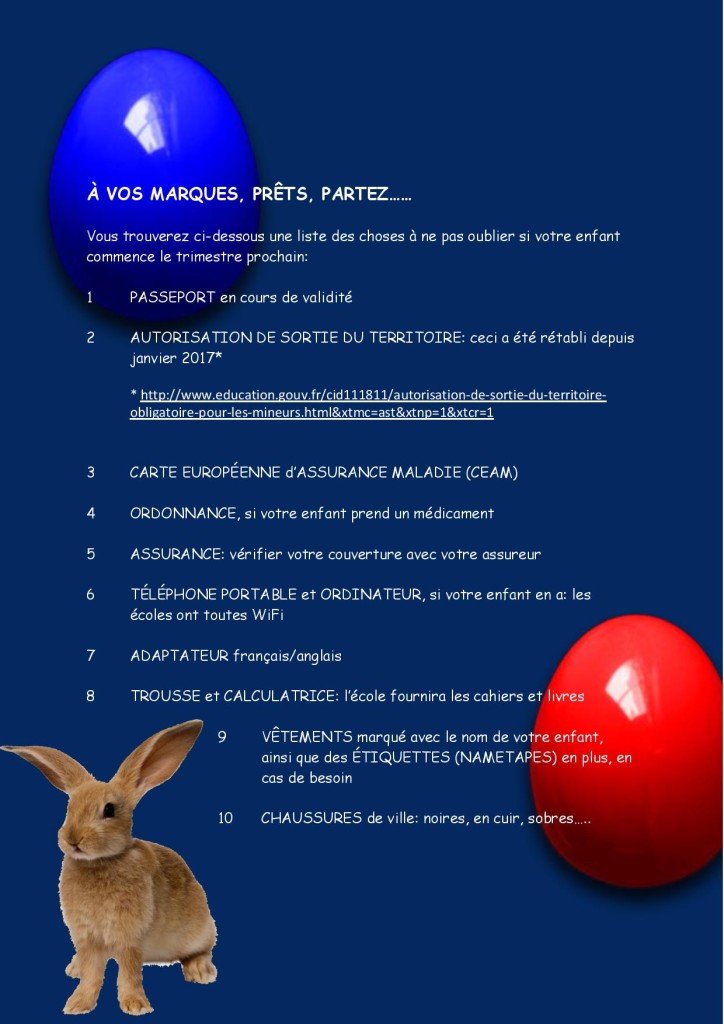
Quelques idées hors sentiers battus, avec des anglophones ou simplement un peu différent que les formules classiques…
WHAT séjour en famille et cours la journée
WHERE Irlande
WHO 8-13 ans
WHEN juin
WHY immersion totale en anglais; familles d’accueil chaleureuses
WHAT école de voile
WHERE Irlande
WHO 14-17 ans
WHEN juin, juillet*, août
WHY hors des sentiers battus; avec des anglophones

WHAT camp de foot
WHERE l’est d’Angleterre
WHO 10-18 ans
WHEN 17-29 juillet
WHY entraînement professionnel de foot pour les passionnés
WHAT camp multi-lingue
WHERE Écosse
WHO 12-17 ans
WHEN 23 juillet – 5 août
WHY une opportunité pour améliorer son anglais, espagnol et allemand
WHAT cursus intensif d’anglais**
WHERE l’ouest de la FRANCE
WHO 11-15 ans
WHEN 5-17 juillet ou 19-31 juillet
WHY révision rigoureuse dans un cadre magnifique; pas besoin de passeport

WHAT programmes éducatifs américains
WHERE dans le monde entier
WHO 14-18 ans
WHEN 24 juin – 7 août
WHY d’excellente qualité, programmes éducatifs (National Geographic, New York Times)
WHAT famille + cours d’été
WHERE Irlande
WHO 11-17 ans
WHEN 3-24 juillet
WHY amusant, amical, peu de français
WHAT programme d’été international
WHERE Angleterre, Écosse, États-Unis
WHO 11-17 ans
WHEN 2 juillet – 16 août
WHY programme de haut niveau: enrichissement créatif

WHAT projet d’été: 3 ou 4 semaines
WHERE ouest de Londres
WHO 13-18 ans
WHEN 9 juillet – 5 août
WHY 40 ans d’expérience; génération après génération
WHAT randonnées, escalade, rafting
WHERE Angleterre, Écosse, Pays de Galle
WHO 15-19 ans
WHEN 26 juin – 25 août
WHY apprendre les règles de la vie; appartenance à une équipe; avec des anglophones
WHAT summer school avec enfants britanniques
WHERE sud ou ouest de Londres
WHO 8-16 ans
WHEN 16 juillet – 20 août
WHY pour faire des amis britanniques
HOW contacter:
* complet du 2-16 juillet
**par ailleurs: 20-27 août ‘Bac préparation’ pour les 15-18 ans: 1,250€
IDEAS IDÉES IDEAS IDÉES IDEAS IDÉES IDEAS IDÉES IDEAS IDÉES IDEAS IDÉES IDEAS
GOLF ESCRIME VTT CHANT
TENNIS RUGBY DANSE FILM
SURF TENNIS de TABLE CUISINE TÉLÉVISION
FOOT VOILE PEINTURE THÉÂTRE
ÉQUITATION NATATION DESSIN CINEMA
BASKET RAFTING MODE JOURNALISME
BADMINTON KAYAK MÉTIERS D’ART PREP à L’UNIVERSITÉ
SQUASH ESCALADE ÉCHECS LEADERSHIP
HOCKEY COURSE à PIED PHOTO INFORMATIQUE
ARTS MARTIAUX RANDONNÉES MUSIQUE IELTS
Pour bien préparer votre séjour, écouter: www.englishwaves.fr
WHAT Family + day (state) school
WHERE Ireland
WHO 8-13 years
WHEN June
WHY Total immersion in English, friendly families
WHAT Sailing school
WHERE Ireland
WHO 14-17 years
WHEN June, July*, August
WHY Off the beaten track, with anglophones

WHAT Football camp
WHERE East of England
WHO 10-18 years
WHEN 17-29 July
WHY Professional training for football-mad teenagers
WHAT Mutli-lingual camp
WHERE Scotland
WHO 12-17 years
WHEN 23 July – 5 August
WHY Opportunity to improve English, Spanish, German
WHAT Intensive English course**
WHERE West of FRANCE
WHO 11-15 years
WHEN 5-17 July or 19-31 July
WHY Rigorous revision in beautiful surroundings; no need for a passport

WHAT American educational programme
WHERE All over the world
WHO 14-18 years
WHEN 24 June – 7 August
WHY Top-quality, educative programmes (National Geographic, New York Times)
WHAT Family + summer school
WHERE Ireland
WHO 11-17 years
WHEN 3-24 July
WHY Fun, friendly, few French
WHAT International Summer Programme
WHERE England, Scotland, USA
WHO 11-17 years
WHEN 2 July – 16 August
WHY High-level programme: creative enrichment

WHAT Summer project: 3 or 4 weeks
WHERE West of London
WHO 13-18 years
WHEN 9 July – 5 August
WHY 40 years of experience: children of previous participants now attend
WHAT Walking, climbing, rafting
WHERE England, Scotland, Wales
WHO 15-19 years
WHEN 26 June – 25 August
WHY Learn ‘Life Skills’; be part of a team; with anglophones
HOW contacter:
* full from 2-16 July
**also 20-27 Aug ‘Bac Preparation’ for 15-18 year olds: 1,250€
IDEAS IDEAS IDEAS IDEAS IDEAS IDEAS IDEAS IDEAS
GOLF TENNIS SURFING FOOTBALL RIDING BASKETBALL
BADMINTON SQUASH HOCKEY MARTIAL ARTS FENCING
RUGBY TABLE TENNIS SAILING RAFTING KAYAKING
CLIMBING RUNNING WALKING BIKING DANCING COOKING
PAINTING DRAWING FASHION CRAFTS
PHOTOGRAPHY MUSIC SINGING FILM TELEVISION
ACTING COMPUTER SKILLS JOURNALISM UNIVERSITY PREPARATION
LEADERSHIP DEBATE CHESS IELTS
Prepare your stay by listening to: www.englishwaves.fr
Are you lost in a sea of possibilities for your child this summer? Too much choice? Don’t know where to start? May I suggest the following:

1) Consider your priorities- eg. dates*, activities, prices**;
2) Take a look at a selection of ideas School Britannia has come up with;
3) Contact School Britannia to take the next step – or to find other options.
*DATES
JUNE There are no summer camps in Britain until the end of the month. Short-term boarding school stays possible or a few options in Ireland.
JULY Summer camps/summer schools, mainly 100% international until c. 22nd July.
AUGUST Summer camps/summer schools, with a mix of British and internationals.
**PRICES are as accurate as possible but may vary according to transfer charges

1) PRIORITIES/DECIDING FACTORS
Dates* Beginning June – end August
Age range 6-18+
Activity Inside, outside, sporty, academic, specialised
Sports Tennis, riding, sailing, golf, foot, rugby…
Specialised Music, technology, film, art, drama, cuisine….
Size 20-500 per week
Academic Debating, culture, law, preparation for university
Qualification IELTS, Cambridge exams
British children Mainly from mid July – end August
Price £675 – £2,000 per week
Length 1 week – 6 weeks: some camps have set numbers of weeks
Boarding school Possible in June in a limited number of schools
Classic Summer schools run by boarding schools
Location North, South, East, West: a few possibilities in Ireland & USA….
Family Stay with a family (not chosen by SB) + activities
A bit different A multi-lingual camp in Britain or a select language school in a château in France
2) IDEAS
BEGINNING JUNE
|
Boarding school |
10-17 |
4 June – 1/8 July |
£850+ = 1 week |
|
Family + day school, Ireland |
9-13 |
June |
£750+ = 1 week |
|
Family on a farm |
10-17 |
All year round |
£995 = 1 week |
|
Sailing school, Ireland |
14-17 |
5th June onwards |
£750 = 1 week |
END JUNE ONWARDS
|
Small, family-run summer school |
8-16 |
25 June onwards |
£1,645 = 2 weeks |
|
International summer school |
10-16 |
27 June onwards |
£2,000+ = 2 weeks |
|
Summer school en Ecosse |
8-17 |
25 June onwards |
£1,590 = 2 weeks |
|
Summer camp in the outdoors |
15-19 |
26 June onwards |
£2,000 = 3 weeks |
|
Academic summer school in Oxford |
15+ |
18 June onwards |
£2,000+ = 2 weeks |
END AUGUST
|
Prepare for school |
15-18 |
21 August – 3 Sept |
£1,800 = 2 weeks |
|
Back to school |
13-18 |
19 August – 26 August |
£1,010 = 1 week |
|
Prepare for English BAC (in France) |
15-18 |
20 August -27 August |
£1,000 = 1 week |
YOUNGSTERS
|
Summer school |
6-11 |
2 July – 12 August |
£2,050 = 2 weeks |
|
Summer school + sport |
6-11 |
9 July – 20 August |
£2,520 = 2 weeks |
|
First summer camp |
7-10 |
11 July – 25 July |
£2,020 = 2 weeks |
|
Academic Summer school |
7-13 |
8 July – 26 August |
£2,100 = 2 weeks |
OLDER ADOLESCENTS
|
Advanced studies |
16-19 |
2 July – 29 July |
£3,180 = 2 weeks |
|
Advanced English |
15-20 |
2 July – 19 Aug |
£2,750 = 2 weeks |
|
Tennis |
15-21 |
2 July – 30 July |
£1,690 = 2 weeks |
|
Cambridge programme |
16-18 |
23 July – 19 Aug |
£3,995 = 2 weeks |
SPORT
|
Equitation |
6-17 |
9 July – 6 Aug |
£2,520 = 2 weeks |
|
Rugby |
9-17 |
2 July – 20 July |
£1,750 = 2 weeks |
|
Golf |
12-17 |
7 July – 5 Aug |
£2,400 = 10 days |
|
Tennis |
10-16 |
5 July – 2 Aug |
£1,860 = 2 weeks |
|
Sailing |
14-17 |
5 June onwards |
£1,500 = 2 weeks |
ARTS
|
Film |
12-17 |
6-20 Aug |
£2,500 = 2 weeks |
|
IT |
9-17 |
30 July – 25 Aug |
£1,850 = 2 weeks |
|
Music |
10-18 |
17 July – 29 July |
£2,000 = 2 weeks |
|
Art/Fashion |
13-16 |
2 July – 29 July |
£3,200 = 2 weeks |
SMALL SIZE
|
Academic studies |
13-18 |
1 July – 26 Aug |
£2,100 = 2 weeks |
|
Small, select summer school |
8-14 |
16 July – 29 July |
£3,000 = 2 weeks |
|
Tennis |
8-17 |
2 July – 19 Aug |
£2,000 = 2 weeks |
ACADEMIC
|
Mini MBA |
15-17 |
2 July – 12 Aug |
£2,500 = 2 weeks |
|
Leadership |
14-17 |
4 July – 15 Aug |
£2,920 = 2 weeks |
|
Oxbridge |
14-18 |
2 July – 20 Aug |
£2,995 = 2 weeks |
ENGLISH QUALIFICATION
|
IELTS |
13-18 |
8 July – 19 Aug |
£2,700 = 2 weeks |
|
Cambridge exams |
12-18 |
2 July – 19 Aug |
£2,150 = 2 weeks |
|
Trinity exams |
6-11 |
9 July – 20 Aug |
£2,670 = 2 weeks |
BRITISH CHILDREN
|
Summer camp multi-activity |
7-16 |
22 July – 2 Sept |
£1,500 = 2 weeks |
|
All-girl summer school |
8-17 |
15 July – 12 Aug |
£2,050 = 2 weeks |
|
Film school |
14-17 |
10 July – 23 July |
£2,500 = 2 weeks |
BUDGET
|
Family + summer school, Ireland |
11-17 |
3-24 July |
£1,750 = 3 weeks |
|
Summer camp multi-activity |
7-16 |
22 July – 2 Sept |
£1,500 = 2 weeks |
|
Sailing school, Ireland |
14-17 |
5 June – end Aug |
£1,500 = 2 weeks |
|
Summer school classic with sport |
9-17 |
2 July – 13 Aug |
£1,750 = 2 weeks |
|
Summer school in Scotland |
8-17 |
25 June – 22 July |
£1,590 = 2 weeks |
3 WEEK PROGRAMMES
|
Activities outside |
15-19 |
26 June – 25 Aug |
£2,000 = 3 weels |
|
Dynamic summer school programme (4 weeks) |
13-18 |
9 July – 5 Aug |
£3,900 = 4 weeks £3,400 = 3 weeks |
|
Top-quality international programme |
13-18 |
2 July – 16 Aug |
£4,200 = 3 weeks |
|
Preparation for International BAC |
15-17 |
2 July – 22 July |
£3,840 = 3 weeks |
SUMMER SCHOOL RUN BY BOARDING SCHOOL
|
Sport |
8-16 |
9 July – 5 Aug |
£2,100 = 2 weeks |
|
More sport |
10-16 |
7 July – 4 Aug |
£2,320 = 2 weeks |
|
Watersports |
11-17 |
3 July – 26 Aug |
£2,000 = 2 weeks |
|
Classic |
7-17 |
1 July – 2 Sept |
£2,400 = 2 weeks |
STAY WITH A FAMILY
|
With individual English lessons |
10-17 |
27 June – 15 Aug |
£2,500 = 2 weeks |
|
+ summer school |
11-17 |
3 July – 24 July |
£1,500 = 3 weeks |
CLASSIC
|
Academic English + activity |
12-17 |
2 July – 19 Aug |
£2,150 = 2 weeks |
|
English + multi activity |
13-16 |
27 June – 15 Aug |
£2,020 = 2 weeks |
LOCATION
|
Ireland |
11-17 |
3 July – 24 July |
£1,500 = 3 weeks |
|
USA |
13-18 |
16 July – 6 Aug |
$6,600 = 3 weeks |
|
North |
8-16 |
7 July – 7 Aug |
£5,300 = 3 weeks |
|
South |
11-17 |
2 July – 5 Aug |
£3,000 = 2 weeks |
|
East |
9-17 |
9 July – 6 Aug |
£2,400 = 2 weeks |
|
West |
7-17 |
10 July – 6 Aug |
£1,850 = 2 weeks |
SOMETHING DIFFERENT
|
Multi-language camp |
12-17 |
23 July – 5 Aug |
£1,600 = 2 weeks |
|
Individual tuition in Oxford |
15-19 |
All summer |
£2,400 = 2 weeks |
|
Select language school in France |
11-15 |
5 July – 31 July |
£1,700 = 12 days |
University applications are in full swing in Great Britain. Thousands of Year 13 pupils are polishing off their Personal Statements which they will send off before 15th January* as part of their UCAS** application.
Then begins the wait for the replies from the five potential universities chosen. One clear choice, however, has already been made: the subject which is going to be studied. This thought gave me the idea of looking into what various people – those in the public eye as well as ‘ordinary’ people – read (studied) at university. What impact does the choice, made very often at the age of 17, have on a person’s future?
My daughter has recently graduated from Bristol university with a degree in Modern Languages and is now hoping to forge a career in Fashion. Her friends at Bristol completed degrees in subjects including German, Economics, Physiology and Neuroscience; it will be fascinating to see what these lead to – just as it is to take a look at previous undergraduates’ subject choices.
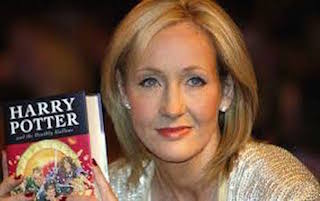
PEOPLE IN THE PUBLIC EYE

FRIENDS WHO GRADUATED IN 1980s

RECENT UNDERGRADUATES
* The deadline for Oxford or Cambridge and medical or veterinary school was 18th October.
**University and Colleges Admissions Services.
For those interested in finding out about how to apply to British universities, contact Sophie de Lageneste
“If someone who speaks many languages is multilingual and someone who speaks two languages is bilingual, what do you call someone who speaks one language? Answer: an Englishman”. So goes the joke.*

Those people who speak more than one language are two-a-penny these days; those who are truly bilingual or multingual are harder to find. As a monolingual parent it has been fascinating to watch my children growing up mastering two languages seemingly without effort; they appear to have made the most of the “celestial openness of the child’s mind” referred to by poets (and also by Patricia Kuhl in her TED talk ‘The linguistic genius of babies“). However, this does tend to throw up interesting phrases such as “the cloche is sonning, Mummy” from my 7 year old son when we had just moved back to France from England, or, just two days ago, from my twenty year old daughter “watch out: the bowl is going to smashé!” A third, private, family language seems to have sprung up unknowingly.

“One language sets you in a corridor for life. Two languages open every door along the way.” Frank Smith, psycholinguist.
Whilst there continues to be debate over the pros and cons of being bilingual or multilingual, it is clear that it has a positive affect on the brain. According to Ellen Bialystok, research professor of psychology at York University, Toronto, we have a network of brain neurons in the cognitive system of our brain: the Executive Function System (EFS). You may know this already, but I didn’t, until I listened to Dr Bialystok discussing bilingualism on English radio: http://www.bbc.co.uk/programmes/b04j9z75
Apparently, the EFS is most important cognitive system we have and forms the basis of the most difficult thinking, performing and problem solving that the human mind can engage in. In short, it helps us to select what we should be concentrating on. The EFS of a bilingual or mutilingual person has regular practise in focusing on which language to choose over another. Practise, as we know, makes perfect: in this case, it certainly exercises and muscles the brain, resulting in people capable of improved decision-making and with a developed ability to focus. Oh, how I wish I were bilingual.

“To God I speak Spanish, to women Italian, to men French and to my horse, German.” Emperor Charles V.
I was intrigued by a friend of my son’s who, aged 13, spoke five languages but said he was not totally at home in any of them. Ignacio has an Austrian mother, a Spanish father, has been educated in England and France and lived briefly in Portugal; he is now based in Spain. Ignacio told me, “If I don’t know a word in Spanish I will say it in English, so sometimes my sentences don’t make much sense; people do say I speak Spanglish alot. And also, since I have never studied Spanish grammar, I don’t know my tenses, so I make up my own. It is quite funny”.
Oliver, my 18 year old godson who I have seen grow up switching easily between English to his father, Dutch to his mother and French to his school friends, tells me that he feels most at home in English, despite the influence of a French education. (However, he does play hockey for France and is going to university in Holland).
One thing is sure: both Ignacio and Oliver are totally charming, engaging young men. Would it be going too far to suggest that this is a direct result of their multilingual backgrounds?
“It is a complicated process being so bilingual. Sometimes it is a mere word or sentence that comes to me – if I am writing the book in English – in French. It is not always easy to deal with.” Tatiana de Rosnay, author
I am always impressed by French children who go directly from French schools to British universities: within weeks they will be expected to hand in long essays, expressing themselves perfectly in a foreign language. It is one thing trying to find the correct words and to put them together without grammatical error, but perhaps the greatest challenge is to present them in a natural form which does not read as a literal translation from one language to another.
Tatiana de Rosnay (who describes herself as a ‘franglaise’), writes some of her novels in English and some in French but, interestingly, does not translate her own books. I would have thought it was challenge enough to produce a novel in one language. Irish playwright Samuel Beckett also wrote both in English and French, novelist Vladimir Nabokov first in Russian and then in English and Joseph Conrad in English although his first language was Polish. Chapeau, as they say.
The recurring comment from those lucky enough to be bilingual or multilingual appears to be that it is easier to express certain things in one language than another; when a suitable word or phrase cannot be found in one, they turn to the other. This could be put down to intellectual perfectionism but, according to my own children, in their case it is pure laziness that leads them to converse in fractured franglais.

“It is both a blessing and a burden.” Cuban-American poet Gustavo Perez Firmat.
It is said that it is not possible to be one hundred percent in more than one language. Assuming that ‘double semi-lingualism’ (not developping full proficiency in either of two languages) is to be avoided, at some point the question arises: ‘what is your mother tongue, your first language?’ From the outside, a faultless accent can appear to give the answer but surely the most important element is which language feels the most comfortable from the inside?
The standard question people ask is “which language do you dream in?” as though this is the ultimate, deciding factor. However, I think “which language do you laugh in?” would be a more pertinent question – or, as my children might put it “in which language do you rigoler?”
*the original answer was, in fact ‘an American’, but I thought it was acceptable to do a little editing.
April 2014
“One of the big findings of modern psychology is that wellbeing is a key ingredient for successful learning.” Peter Gumbel
MY STORY: 1970s/1980s
I was longing to go to boarding school. I had done my homework; hours invested in the pages of Enid Blyton’s Malory Towers had served to fire my imagination and made me dream of lacrosse, midnight feasts and classroom pranks. In 1978, aged 12, my wish came true. I posed proudly on our lawn in my new school uniform (the height of 70s crimplene) whilst my father recorded the departure of his youngest child, hugged and kissed my beloved cat and left for my new life with a skip and a jump and a heart bouncing with anticipation. (I presume I kissed and hugged my parents as well).
And so began my boarding school adventure: four years shared with 499 other teenage girls. I loved it; the rules (and also breaking them), the team sports (lacrosse, of course), the mealtimes (plastic bread, plastic meat – and chips), the fire practices (organized in the middle of the night in our pyjamas), the tennis matches played late on summer evenings, the pottery room in the attic, the assemblies when the whole school gathered together and sang. I soaked it all up. Perhaps I was an unusual creature; amongst my friends it was cool to be in rebellion against ones family and ones school, but I loved both.
The food was pretty revolting and of minimal nutritional value, the headmistress was terrifying, we didn’t have mobile phones or computers and were forced to write a weekly letter to our parents (our only form of communication). We slept in small ‘cubicles’, separated by partitions and curtains, were yanked out of bed to say prayers in the early morning and were treated to a weekly television ration of Dallas and Top of the Pops. We shivered beside the open-air pool awaiting orders from a sadistic swimming teacher, lay around at the week ends eating sweets (courtesy of our weekly 30p pocket money) and squealed when we received a letter from a BOY.
This may paint a very bleak picture of life at a British boarding school, yet, even in the early 80s, these institutions had come along way in improving their Dickensian reputation of cold showers, fagging and flogging. The “Colditz in kilts” which Prince Charles had endured was gradually becoming a thing of the past. These schools, which had once reveled in teaching children (sometimes as young as 6) to keep a ‘stiff upper lip’, through all means of adversity and punishment, began to soften and modernise. As the years have gone by, they have become happy places of learning and friendship, finding an even balance between effort and reward, whilst maintaining tremendous records of achievement in every domain.
MY CHILDREN’S STORY: 2010
“Twenty years from now you will be more disappointed by the things you didn’t do than by the ones you did do. So throw off the bowlines. Sail away from the safe harbour. Catch the trade winds in your sail. Explore. Dream. Discover.” Mark Twain
We had two options: we could either keep our four teenage children at home with us in France and continue our close and comfortable family life, or send them 800kms away to boarding school in the north of England. We chose the English route, thereby taking not only a massive, emotional decision, but also making a significant financial sacrifice.
Pretty much every day in France I am met with incredulous looks of horror and incomprehension. “How could you send your children so far away?” people ask in shocked tones; “that must be so hard.” It is hard; horribly so at times, and there are moments of miserable emptiness (for us, the parents left at home). Yet, as soon as I speak to my children and feel their happiness and enthusiasm, or receive a short email saying no more than “Really busy, lots of love,” I am reassured. Any worries or doubts that may linger are totally banished when we go to the school itself. Welcomed as part of the close community and made to feel very much at home, we are able to see our children joking with their friends, racing around on the sports field, performing on stage, chatting to teachers. Then I know without doubt that this choice – for my children – was the happiest one.
The trigger for me came five years ago when I spent a week in England looking after my ailing father. I made the last-minute decision to take my ten-year old son out of his French school and enroll him in a local prep school as a day boy. The first morning I dropped off a slightly anxious child, awkward in his unfamiliar tie and grey flannel trousers. Ten hours later I was greeted by a grubby creature, bobbing up and down in excitement. “Mummy, Mummy,” he gabbled as soon as he saw me, “we did experiments in science and I played rugby and we lay on the floor in the library and read, and Rosie said……” My heart leapt and sank in swift succession. How could I deny my children this wonderful opportunity, this freedom and joyful adventure?
It has been tremendously rewarding to see our children thrive in the boarding school environment. Our daughter, who arrived in the Sixth Form, rang us during her first week to say, “thank you, thank you, I am so happy; I am going to send my children here.” One son, who had stalled at school, has had his interest in learning re-kindled through positive encouragement. Another son has grown in confidence, finding his strengths both in and out of the classroom. And then there is the youngest: even more passionate today about science and who is a regular visitor to the school infirmary with rugby injuries. Who knows what the future holds for any of them? Butcher, baker candlestick maker; whatever they go on to do, I am pretty sure that they will be always aided by the solid foundation of their all-rounded school days.
YOUR CHILD’S STORY: 2014 and on
“Teaching is an art form. It is not a delivery system. It’s about getting to know your students and finding good ways to energise them and engage their imagination”. Sir Ken Robinson
There is a multitude of words that trip off my tongue when I am extolling the virtues of the British boarding school system. Encouragement, confidence-building, fair play, team spirit, independence, self-respect, tradition, good manners, creativity, emotional intelligence….. the list is long and positive. This is made possible with the help of enthusiastic teachers who encourage active participation, small class sizes, a streaming system to cater for a range of abilities, the strong tutor structure, the overall house set-up within each school. This is all held together by a vital pastoral element.
Of course, there are many other factors which help to make a successful and happy school and each establishment will have a particular strength or ethos which sets it apart from others. There is a school for everyone: the highly academic, the seriously sporty, the shy child, as well as the outgoing one. Whichever place you decide suits your child, you can be sure they will be closely guided throughout their stay at the school, and the parent given regular updates of his or her progress. Individual learning support is offered to those children with special needs such as dyslexia, and your child’s academic life is not over if they struggle in maths. The school will soon uncover a pupil’s potential, stimulate their curiosity and fire up in them a desire to learn.
It is true that the facilities are often of exceptional standard: golf courses, equestrian centres and Olympic-sized pools are not uncommon. It is also true that the pupils are extremely privileged; neither can the significant school fees be ignored. But there are facts to be taken into account which show that the independent sector makes increasing efforts to share its privileged status. 9 out of 10 fee-paying schools have an agreement with local state schools or community groups. Most independent schools have close ties to chosen charities and encourage their pupils to become involved in fund raising and help those left fortunate, in Britain and around the world. In 2010 £300 million was put towards bursaries to help 40,000 children attend independent schools.
The recent film, Guillaume et les garcons à table may have been fairly eccentric and its portrayal of the idyllic British boarding school somewhat far-fetched, but it was joyous to see Guillaume thrive and relish in the new life thrown open to him. I tell my own children that they have been given a wonderful opportunity and that they should make the most of every minute. When I visit these impressive establishments today, I often wish I could go back to school again myself.
September 2014
“Mummy, I think I have forgotten something.” Eustache, 15
We are in the middle of our 800km journey back to school: one frazzled mother, four over-sugared, gangly teenagers, two hot and hairy dogs and several hastily-packed suitcases, all squashed together into our rather dirty car. Of course, when our first child started off on the British boarding school adventure everything was meticulously organised; each item on the school list name-taped, folded and neatly arranged weeks ahead.
Five years on, and times have changed: I now take turns at the wheel with my two elder children (thanks to driving lessons taken whilst at school), giving me time to run through my long-neglected to-do list and to scrabble around in my cavernous hand-bag for a needle and thread. One son is attempting to write a long overdue thank-you postcard, the novelty of holding a pen proving a challenge. Another is gazing happily out of the window as though this is another day out to the beach. Pink Floyd’s “I don’t need no education” accompanies us along the motorway…..
Two delicious, barefoot months have come to an abrupt end; it is time to knot the school tie once more. There has been a mad dash to the dry cleaners with several dishevelled suits and the vigorous polishing of black leather lace-up shoes. Long-forgotten hairbrushes have been unearthed and hasty last-minute shopping trips made on discovering that each child appears to have shot up another 5cm during their long and lazy summer. An alarming number of pieces of clothing have an unfamiliar name on them; my husband went off to work with socks labelled “Johnnie H. Travers”. Every Bédier sock seems to have vanished into a Black Hole.
A fat volume of “War and Peace” is jammed under one of the back seats; it has spent most of the summer there. My attempts to keep up my children’s cultural education during the holidays have met with some resistance; I would be surprised if any of them can remember how to spell their name.
Children will be arriving from all corners of the world to start the new school year at boarding schools across Britain. For many, the journey will be longer than ours, even with the progress of modern global travel. A friend described to me her trips, at the age of 12 in the 1970s, from her home in Morocco to her boarding school on the Isle of Wight. This involved a ‘plane, a night in London, a train, a ferry crossing, another train and finally a taxi. She didn’t see her parents for months on end.
I cannot say that my children are actively looking forward to going back to school: few people, I think, would choose to get out of bed at 7.30am rather than 12.30pm, or take up revision of German verb endings instead of idly flicking through a magazine whilst sprawled on a sofa, hammock, beach, boat or similar relaxing location. There is, however, a certain positive anticipation in the car as to what lies ahead.
A new school year at a British boarding school brings with it not just hard work and the conforming to school rules: it also gives pupils the chance to build on successes already achieved or to have another go at things not yet mastered, as well as the opportunity to take up new ventures. Above all, however, is the reunion with close friends. Facebook has been in full use over the summer, but nothing – I am glad to report – beats the real thing.
By the time I am back behind my desk in France a few days later, I have already received several happy messages from England. Single room status has been achieved, as has membership of the Cheese & Wine Society and a place in the senior squash squad. Preparations for a raft race and involvement in charity fund-raising are under way; a busy school year is up and running once more. One son even remembers to add, as an after-thought: “They have already given us so much work to do”. I am reassured.
Spending a complete academic year at a British boarding school allows for a wide choice of options; this is the minimum period many schools will accept. It also gives a pupil the time to adapt to new surroundings, to make long-standing friends, to perfect his or her English – and to learn a variety of new skills.
Here are 10 ideas for different ages, budgets and interests.
The prices are approximate annual fees.
1 TRADITIONAL PREP SCHOOL: 7-13
Happy, busy and homely: £19,500 up
2 CNED: 7-13
Possibility of continuing French curriculum alongside the British timetable: £25,020
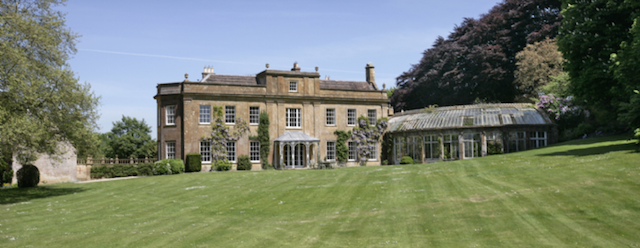
3 BUDGET: 11-18
Small and friendly: £20,943
4 TOP OF THE RANGE: 11-18
State of the art facilities: £35,775
5 PRE-IB/’A’ LEVEL YEAR: 15-16
One year preparation for international pupils: £28,500 up
6 SIXTH FORM COLLEGE: 15-19
Small, international, tutorial-based: £31,095

7 SPORTS ACADEMIES: 11-18
Intensive coaching in golf, riding, tennis, swimming and other sports alongside regular classes: £28,500 up
8 GRAMMAR SCHOOL: 11-18
All boy, academically challenging: £11,250
9 PRE-MEDICAL STUDIES: 16-17
One year course preparing for medical school: £34,050

10 STATE BOARDING SCHOOL: 11-18
Larger class sizes – smaller fees: £14,355
I would like to think I am well-placed to give advice on how to learn a foreign language: marry a foreigner. Yet, even this somewhat radical step does not necessarily bring instant fluency: despite also living in my husband’s country, 20 years on I am still grappling to get the words out. Although many kind people insist that my accent is “charmant” I am very grateful that I do not have to listen to it myself
However, I could give advice on how not to learn a foreign language: spend 12 years reciting sentences such as “la plume de ma tante” (strangely enough, I have never used this phrase outside the classroom). I remember a whole school year of French classes taken up with drawing and cutting out a “valise”. Although it is true I spent most of the time in the corridor outside the classroom due to my disruptive behaviour, I think I can be forgiven: at the age of 6, eager and energetic, I was hungry for knowledge and frustrated by the limited expectations.
 Experts may disagree with me, but the fact that my French teachers had names such as Mr Golding and Mrs Bradley surely played a role (I won’t be cruel and start talking about their age – everyone seems very ancient from a child’s view). Even today I still ponder long and hard as to the gender of ‘beurre’ or ‘fleur’: hard to shed the ingrained rule – according to Mr G and Mrs B – that every noun ending in ‘e’ is female.
Experts may disagree with me, but the fact that my French teachers had names such as Mr Golding and Mrs Bradley surely played a role (I won’t be cruel and start talking about their age – everyone seems very ancient from a child’s view). Even today I still ponder long and hard as to the gender of ‘beurre’ or ‘fleur’: hard to shed the ingrained rule – according to Mr G and Mrs B – that every noun ending in ‘e’ is female.
So that was then and this is now. Has the method – and final result obtained – in learning languages improved? The British department of education states “Learning a foreign language is a liberation from insularity and provides an opening to other cultures”: an intelligent and forward-thinking statement – and yet it is no longer compulsory to learn a modern language at school after the age of 11 (and only a cursory amount from 7-11). The British have now become so complacent about being understood throughout the world without opening a phrase book that the motivation for studying another language is dwindling rapidly.
 How are languages taught in the French classroom today? Probably a lot better than in Britain and somewhat worse than in Scandinavia. I was amused to discover only the other day that my own children had watched videos of the cartoon “Pingu” whilst at their French primary school. As I had no idea what they were refering to I have just spent 5 minutes (quite enough, thank you) on YouTube – https://www.youtube.com/watch?v=Fyk1394JF6k. Quite how anyone is supposed to improve their English thanks to Pingu I know not. I can afford to be amused; my children are already bilingual, but this is not so funny for French families who know that their children have to be able to communicate fluently in English.
How are languages taught in the French classroom today? Probably a lot better than in Britain and somewhat worse than in Scandinavia. I was amused to discover only the other day that my own children had watched videos of the cartoon “Pingu” whilst at their French primary school. As I had no idea what they were refering to I have just spent 5 minutes (quite enough, thank you) on YouTube – https://www.youtube.com/watch?v=Fyk1394JF6k. Quite how anyone is supposed to improve their English thanks to Pingu I know not. I can afford to be amused; my children are already bilingual, but this is not so funny for French families who know that their children have to be able to communicate fluently in English.
Many French parents gnash their teeth worrying about what they believe to be the poor level of their children’s English, but on the whole I have been impressed by the ability of the French teenagers I have met to converse with me. Perhaps it is just a question of confidence and the lack of opportunity to put the theoretical learning into practice. “The French school system is built around negativity. There is lot’s of telling pupils off and putting them down and in the end they come out of it believing they are bad at languages; a lot of French people say that themselves” says David Stenning, director of Interface Business Languages in Paris.
 The comment made to me by the father of a 15 year old French boy made me think. He was looking for somewhere to send his son at the beginning of the summer and I suggested him going to a British boarding school for the month of June. His father replied that it would be a waste of time for his son to sit in lessons with British children; he said that he knew how easy it was to ‘zone out’ when a conversation was hard to follow and that he himself had only learnt a few words of slang after 3 months working in a bar in England as a student.
The comment made to me by the father of a 15 year old French boy made me think. He was looking for somewhere to send his son at the beginning of the summer and I suggested him going to a British boarding school for the month of June. His father replied that it would be a waste of time for his son to sit in lessons with British children; he said that he knew how easy it was to ‘zone out’ when a conversation was hard to follow and that he himself had only learnt a few words of slang after 3 months working in a bar in England as a student.
It is true that simply going to a foreign country – whether it be to school, university or even to work – is not enough. Anyone can spend years abroad and return with no more than the ability to ask for a loaf of bread or pint of beer. Useful knowledge, of course, but perhaps not totally satisfactory. The key is to get involved and participate, rather than being a silent onlooker. The boy’s father and I had a long and interesting chat and I was able to assure him that a good school in England would encourage pupil participation, aided by the fact that class sizes are small and streamed according to ability. (His son did go to boarding school for the month of June and the stay was, I believe, a great success).
 Should a child who goes to a summer school in Britain take (often optional) English language classes? I would say yes, if they are ‘hands on’, fun and interesting but probably not if they are simply a repeat of the experience in the child’s class at home; there is little point in packing a suitcase for this. Taking part in an activity which interests a child – tennis, riding, rowing, sailing, painting, singing: whatever it may be – in which they will be forced (in the most natural way) to converse with intructors and other children in English, would be a much more positive, fruitful exercise. It is a well-known fact that we learn best when we are interested, involved and happy in what we are doing; the effort is a more pleasurable and positive experience.
Should a child who goes to a summer school in Britain take (often optional) English language classes? I would say yes, if they are ‘hands on’, fun and interesting but probably not if they are simply a repeat of the experience in the child’s class at home; there is little point in packing a suitcase for this. Taking part in an activity which interests a child – tennis, riding, rowing, sailing, painting, singing: whatever it may be – in which they will be forced (in the most natural way) to converse with intructors and other children in English, would be a much more positive, fruitful exercise. It is a well-known fact that we learn best when we are interested, involved and happy in what we are doing; the effort is a more pleasurable and positive experience.
This is not to ignore the importance of knowing how to write a language fluently and there are some very interesting courses with a more academic emphasis on offer in Britain for the older child. Whilst the tried and tested ‘séjour linguistique’ is still in existence, there is now the possibility for teenagers to learn about Business, Law, Public Speaking, Debating, Team Building – all in English.
So what is the best way to learn a foreign language? Start as young as possible, converse with native speakers, read, watch and listen to everything and anything in that language with passion and enthusiasm: throw yourself into it, without inhibition or hesitation. This is my amateur opinion and nothing new.
Why are my children billingual? Simply because I have always, always, always spoken English to them and my husband French – and – just as importantly – they have always replied in the same language. Why do the Dutch and Scandinavian speak such fantastic English? Because they have to. They are immersed in English from an early age – particularly via the television; it is second nature to them.
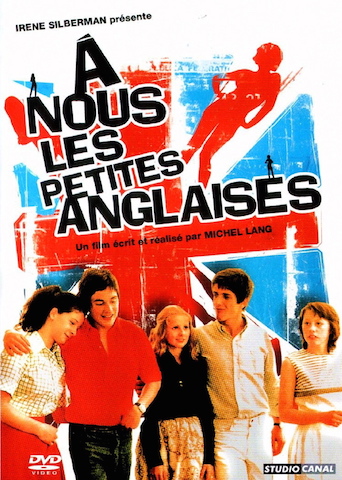 Take heart, though, if you feel that you have already left it too late for your child ever to be comfortably fluent in English. My husband spurned English at school in favour of German and Russian. At the grand age of 24 he took himself off to Hastings for a ‘séjour linguistique’ (shades of ‘A Nous les Petites Anglaises’) and, by the time I met him (not in Hastings, I hasten to add) a year or so later (conversing in English, despite my ‘A’ level French) one would be hard pressed to believe he was a relative newcomer to the English language. He can still recite reams of German poetry and sing in Russian, although he never uses either language. Is this because he has what we call a ‘good ear’ or do I have to admit that he is just a touch cleverer than me?
Take heart, though, if you feel that you have already left it too late for your child ever to be comfortably fluent in English. My husband spurned English at school in favour of German and Russian. At the grand age of 24 he took himself off to Hastings for a ‘séjour linguistique’ (shades of ‘A Nous les Petites Anglaises’) and, by the time I met him (not in Hastings, I hasten to add) a year or so later (conversing in English, despite my ‘A’ level French) one would be hard pressed to believe he was a relative newcomer to the English language. He can still recite reams of German poetry and sing in Russian, although he never uses either language. Is this because he has what we call a ‘good ear’ or do I have to admit that he is just a touch cleverer than me?